
by David Levinson
The appearance of doing something
One of the German Empire’s colonies before the First World War was German South West Africa, nestled between what are today South Africa, Angola, and Botswana. After the war, South Africa was granted a mandate over the colony by the League of Nations, similar to Britain’s control over Palestine or France’s over Lebanon and Syria. The League was dissolved in 1946 and replaced by the United Nations. In general, mandates were intended to be replaced by United Nations Trusteeship, and the General Assembly recommended that South West Africa be one of those, however South Africa refused. In 1949, South Africa declared that it was no longer subject to U.N. oversight where South West Africa was concerned, as they began to extend their apartheid system into the former colony. The following year, the International Court ruled that the U.N. should exercise supervision in the administration of the territory in place of the League, but South Africa rejected the Court’s opinion and has refused any involvement by the U.N.
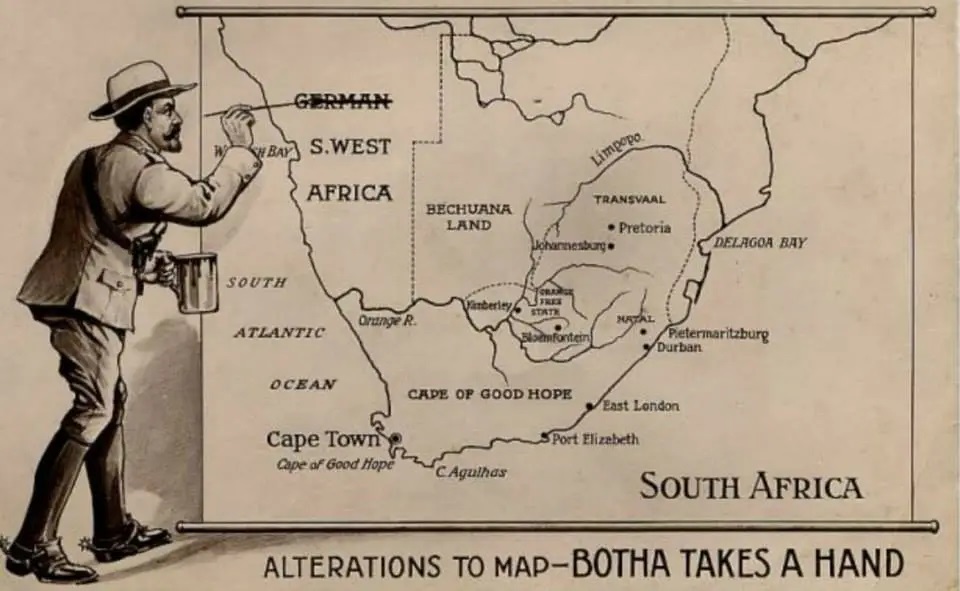 A political cartoon from after the First World War.
A political cartoon from after the First World War.
Independence movements have swept through Africa over the last decade, and as I noted in January of last year, South West Africa is not immune. The predominant organization is the South West Africa People’s Organisation (SWAPO), and they have been lobbying the U.N. for several years. In 1966, the General Assembly terminated the mandate, giving the U.N. direct supervision of the territory. Last year, they established the United Nations Council for South West Africa to administer the territory until independence. South Africa remains recalcitrant. And so, on June 12th, the Assembly approved Resolution 2372, which, in accordance with the wishes of the people as represented by SWAPO, changed the name to Namibia. Well, that, some finger-wagging at South Africa and the nations supporting the illegal occupation of Namibia, and a request that the Security Council do something to get South Africa out. Don’t hold your breath.
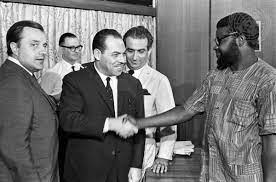 Sam Nujoma (r.), President of SWAPO, shakes hands with Mostafa Rateb Abdel-Wahab, President of the Council for Namibia
Sam Nujoma (r.), President of SWAPO, shakes hands with Mostafa Rateb Abdel-Wahab, President of the Council for Namibia
Noir, nonsense, and the blatantly obvious
The stories in this month’s IF range from the patently obvious to those that leave the reader wondering why the author bothered. There are a couple of mildly entertaining stops along the way, and the high point may surprise you (even if it is more molehill than mountain).
 Supposedly for Rogue Star, which doesn’t have a starship crash. Or this many characters. Art by Chaffee
Supposedly for Rogue Star, which doesn’t have a starship crash. Or this many characters. Art by Chaffee
Continue reading [July 2, 1968] What’s the Point? (August 1968 IF)

![[July 2, 1968] What’s the Point? (August 1968 <i>IF</i>)](https://galacticjourney.org/wp-content/uploads/2023/06/IF-1968-08-Cover-505x372.jpg)
![[June 2, 1968] Necessary Evils (July 1968 <i>IF</i>)](https://galacticjourney.org/wp-content/uploads/2023/05/IF-1968-07-Cover-543x372.jpg)
 The Baltimore Nine shortly after their arrest. Fr. Philip Berrigan is 2nd from the left in the back row.
The Baltimore Nine shortly after their arrest. Fr. Philip Berrigan is 2nd from the left in the back row.
 Abbott and his men are the first to reach the Sleeper’s chamber. Art by Gray Morrow
Abbott and his men are the first to reach the Sleeper’s chamber. Art by Gray Morrow![[May 2, 1968] The Thing with Feathers (June 1968 <i>IF</i>)](https://galacticjourney.org/wp-content/uploads/2023/04/IF-Cover-1968-06-672x372.jpg)
 l. New Governor-General Banja Tejan Sie. r. New Prime Minister Siaka Stevens.
l. New Governor-General Banja Tejan Sie. r. New Prime Minister Siaka Stevens. No one has ever seen the prison of Brass from the outside. Art by Vaughn Bodé
No one has ever seen the prison of Brass from the outside. Art by Vaughn Bodé![[April 2, 1968] Asking the big questions (May 1968 <i>IF</i>)](https://galacticjourney.org/wp-content/uploads/2023/03/IF-1968-05-Cover-569x372.jpg)
 Alexander Dubček addresses the nation after taking office.
Alexander Dubček addresses the nation after taking office. Supposedly for Dismal Light, which doesn’t even have two male characters. Generic art by Pederson
Supposedly for Dismal Light, which doesn’t even have two male characters. Generic art by Pederson![[March 2, 1968] Rules and Regulations (April 1968 <i>IF</i>)](https://galacticjourney.org/wp-content/uploads/2023/02/IF-1968-04-Cover-639x372.jpg)
 The stars of the show. (l.) Jean-Claude Killy sporting his medals. (r.) Peggy Fleming in her spectacular performance.
The stars of the show. (l.) Jean-Claude Killy sporting his medals. (r.) Peggy Fleming in her spectacular performance. The Advanced Guard prepare to study the fauna of Chryseis. Art by Vaughn Bodé
The Advanced Guard prepare to study the fauna of Chryseis. Art by Vaughn Bodé![[February 4, 1968] More of the Same (March 1968 <i>IF</i>)](https://galacticjourney.org/wp-content/uploads/2023/01/IF-1968-03-Cover-434x372.jpg)
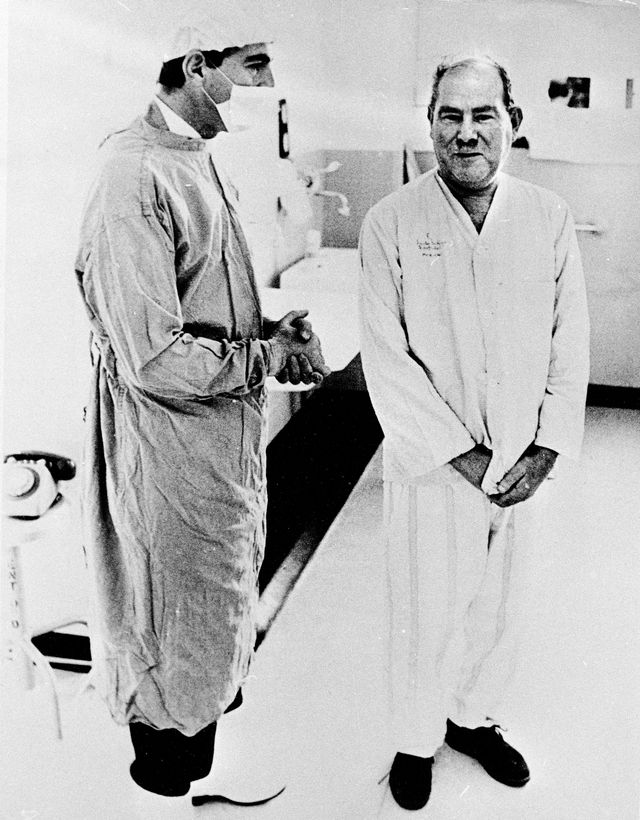 Dr. Barnard (I.) and Philip Blaiberg (r.), probably before the surgery.
Dr. Barnard (I.) and Philip Blaiberg (r.), probably before the surgery. Dr. Shumway at a press conference last fall (l.), Mike Kasperak and his wife, Ferne (r.)
Dr. Shumway at a press conference last fall (l.), Mike Kasperak and his wife, Ferne (r.) This unpleasing collage is for Harlan’s new story. Art by Wenzel
This unpleasing collage is for Harlan’s new story. Art by Wenzel![[January 2, 1968] The consequences of success (February 1968 <i>IF</i>)](https://galacticjourney.org/wp-content/uploads/2022/12/IF-1968-02-Cover-672x372.jpg)
 Louis Washkansky talks to Dr. Barnard in the days following the surgery.
Louis Washkansky talks to Dr. Barnard in the days following the surgery. This dreamscape doesn’t appear in Robert Sheckley’s new story, but it could. Art by Vaughn Bodé
This dreamscape doesn’t appear in Robert Sheckley’s new story, but it could. Art by Vaughn Bodé![[December 2, 1967] Women and Men (January 1968 <i>IF</i>)](https://galacticjourney.org/wp-content/uploads/2022/11/IF-1968-01-Cover-672x372.jpg)
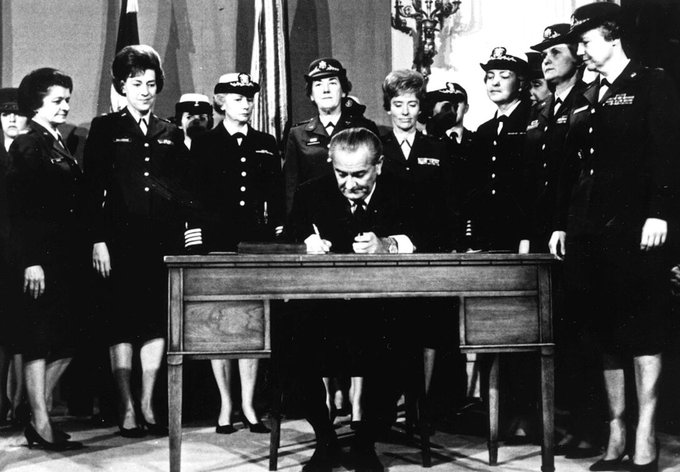 President Johnson signing the law allowing women to rise in the ranks.
President Johnson signing the law allowing women to rise in the ranks.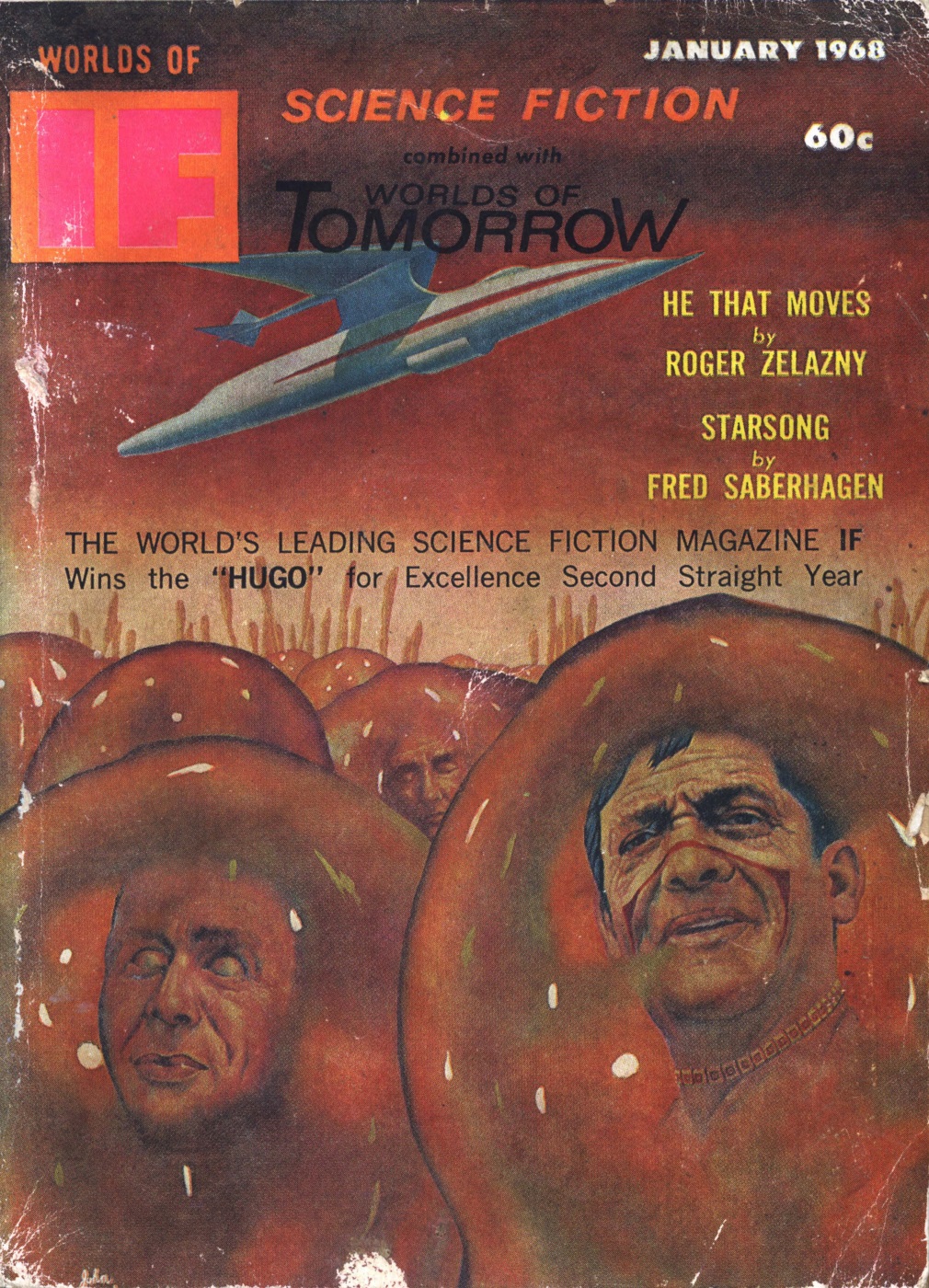 What are these people doing in these blobs? Art by Pederson
What are these people doing in these blobs? Art by Pederson![[November 4, 1967] Conflicts (December 1967 <i>IF</i>)](https://galacticjourney.org/wp-content/uploads/2022/10/IF-1967-12-Cover-672x372.jpg)
 Joan Baez is arrested in Oakland.
Joan Baez is arrested in Oakland. Fr. Berrigan pouring blood into a file drawer.
Fr. Berrigan pouring blood into a file drawer. Futuristic combat in The City of Yesterday. Art by Chaffee
Futuristic combat in The City of Yesterday. Art by Chaffee![[October 2, 1967] Switching Sides (November 1967 <i>IF</i>)](https://galacticjourney.org/wp-content/uploads/2022/09/IF-1967-11-Cover-672x372.jpg)
 The logo for the traffic changeover.
The logo for the traffic changeover. This photo was staged several months ago as part of the education campaign. The real thing was much less chaotic.
This photo was staged several months ago as part of the education campaign. The real thing was much less chaotic. A newcomer gets the cover. Does he deserve it? Art by Vaughn Bodé
A newcomer gets the cover. Does he deserve it? Art by Vaughn Bodé